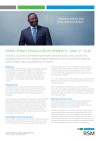On June 3, 2020, the Committee of permanent representatives in the Council of the European Union (EU) have agreed to allow EU Member States to exercise the option to defer the DAC6 reporting deadline by six months.
Background
On Friday May 8, 2020, the European Commission released a proposal to extend the filing deadlines under DAC6. In our newsletter explaining the implications of the proposal, we noted that the proposed extension did not provide much comfort, and the urgency for Internationally active companies to act on DAC6 would remain a high priority matter.
What happened?
A political agreement was reached by the Committee of permanent representatives in the council of the European Union (EU) to allow an optional 6 months extension to the reporting deadlines for intermediaries and relevant taxpayers.
In this regard, the amended proposal could be adopted during the next meetings of Economic and Foreign Affairs council (ECOFIN) and the European Council scheduled this month. The European Parliament is expected to provide its opinion on the outcome of those meetings by the end of June. The amending directive would then be implemented into the local laws after Member States independently decide upon extension or no extension.
New Deadlines (if deferral is approved)
The so-called “historical reference period” (running from June 25, 2018 up to and including June 30, 2020) shall remain the same. This means that where a so-called reportable cross-border arrangement is made available for implementation, or is ready for implementation, or where the first step in its implementation has been made between June 25, 2018 - June 30, 2020, this arrangement must be reported no later than February 28, 2021.
The “new” reference period shall depend upon each individual Member State as Member States shall opt for the deferral on an individual basis.
So far, few Member States have announced to opt for extension of 6 months (e.g. Belgium and Luxembourg). In this case, the new reference period (1 July 2020 until 31 December 2020) shall apply, and the 30-day reporting period shall start from 1 January 2021.
What does this mean for you?
As the delay is optional, and depends upon the individual decisions of Member States, this may imply different reporting deadlines and potentially added complexity and difficulty for businesses active in the EU.
Jurisdictions offering the extension will allow more time for internationally active companies to get prepared for DAC6, which also includes the process of determining whether or not DAC6 is applicable. However, in some other jurisdictions, where the deferral might not be opted for, the reporting could be due much earlier, hence increasing the compliance burden and risk of penalties in case of delayed or no reporting.
Although the reporting deadline could be extended in some EU Member States, companies must pay attention to fully utilize that extra time as the deadline for “historical reference period” may seem later (at the latest February 28, 2021) but the new reference period also covers a longer period (6 months instead of initial 1 month), i.e. until December 31, 2021 instead of July 31, 2020 .
This implies increased compliance burden to analyse transactions, form conclusions, document transactions and timely report to the relevant tax authorities.
What are the next steps?
So far, we have noticed that a lot of internationally active companies are underestimating the width of DAC6. Certainly, aggressive tax structuring is part of the DAC6 scope. However, what is considered aggressive is subjective and certainly has changed in the last 3 years. Therefore, we feel that it is important to analyse whether or not DAC6 should be applicable, especially in relation to the so-called historical reference period. Also, it is important to document why an arrangement is deemed reportable or non-reportable.
As we expected, the European Commission will continue to focus heavily on tax transparency but also refers to COVID19 as a reason to implement DAC6. For now, the extra time some Member States could opt for is not expected to generate further guidance. Therefore, we recommend strongly to internationally active companies, whenever possible, placing DAC6 high on the tax agenda and at least determine in more detail the possible impact.
More information?
Please contact your trusted RSM advisor to further discuss which measures may be relevant for you and your business.
Download 'News Update on DA6 developments - Juni, 9th 2020' in pdf.
Other article about DA6 development:

